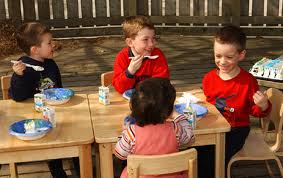
Picture this…
Sophie is 4 years old. She is asked to sit at the table for lunch… it is tuna bake today. Sophie really dislikes tuna and they never eat it at home… as Dad dislikes it too!
Sophie is best friends with Ava and they love to chat over lunch, however they are always placed at different tables because they talk too much. Sophie sits and begins to pick at the pasta bake, eating only the pasta. The educator tells her “Sophie, eat your lunch please..you need to at least try it ”
But why??? Sophie already knows she does not like it! The educator seems upset with her and says “oh stop that.. Now eat up your lunch, its not that bad!” Sophie eats the pasta only and leaves the tuna. She feels satisfied and is looking forward to yoghurt however she receives only a small amount. When she asks for some the educator says “you didn’t eat your lunch Sophie”.
Have you seen a similar scenario before?
What messages are we sending children about eating, food, having preferences? Why do children have to like everything, when we don’t? Why do children have to eat everything on their plate or rush through their meal when we should in actual fact eat slower so we don’t consume everything on our plate? http://children.webmd.com/guide/kids-healthy-eating-habits
Why can’t meal times be social occasions where children can chat, laugh and enjoy each other’s company? How does this support children’s sense of well-being?
The National Quality Standards state that healthy eating is promoted and that children are supported through respectful and equitable relationships with educators. The above scenario does not reflect these standards, instead it demonstrates a coercive, disrespectful interaction which confuses and intimidates the child.
Children’s days are busy and meal times provide them with the opportunity to sit and interact in a relaxed way with their friends. It is a time to listen, discuss food and nutrition, it is a time for staff to observe friendships and for children to enjoy the social context of food rather than possible negative emotions linked with eating.
By creating a more supportive environment you will promote a sense of belonging and community within your service and observe children developing their autonomy and interdependence, a sense of well-being along with wonderful social skills.
So let’s treat meal times like we would sitting in our favourite cafe… let’s relax, chat and enjoy each other’s company!
Feel free to post comments / images about your meal time set-ups!
Leave a Reply